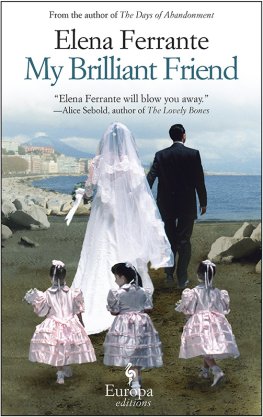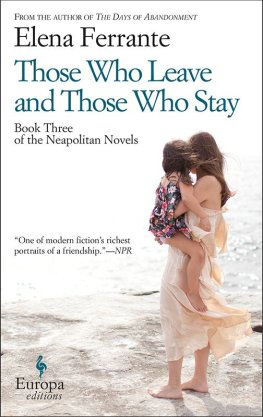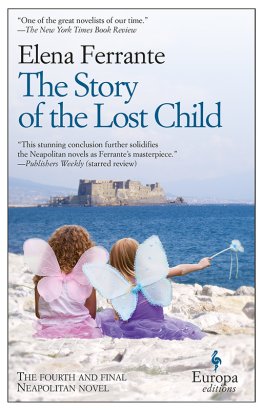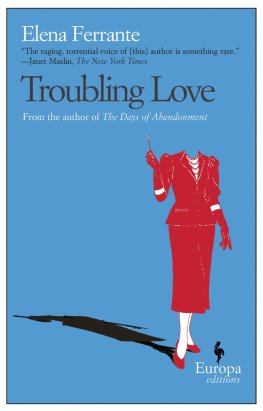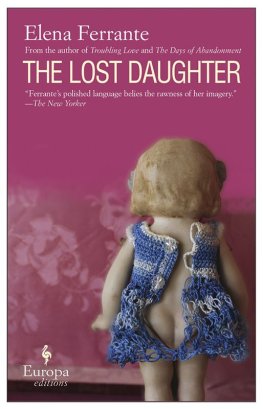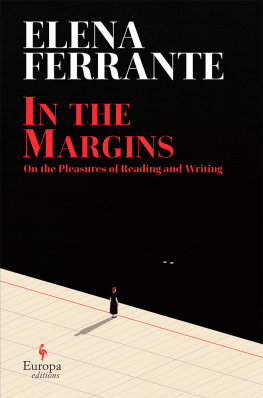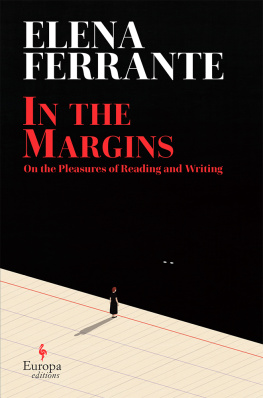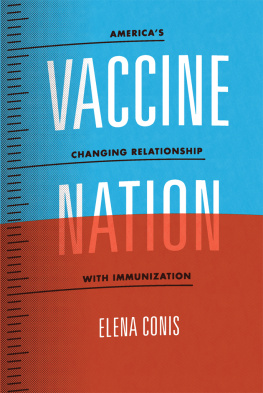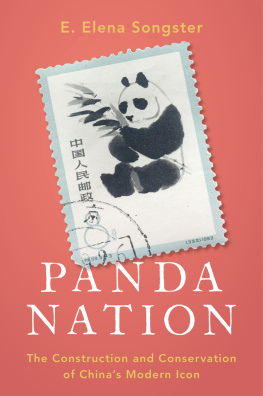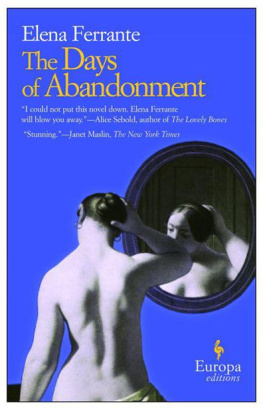Elena Ferrante
My Brilliant Friend
THE LORD: Therein thourt free, according to thy merits;
The like of thee have never moved My hate.
Of all the bold, denying Spirits,
The waggish knave least trouble doth create.
Mans active nature, flagging, seeks too soon the level;
Unqualified repose he learns to crave;
Whence, willingly, the comrade him I gave,
Who works, excites, and must create, as Devil.
J. W. GOETHE, Faust, translation by Bayard Taylor
The Cerullo family (the shoemakers family):
Fernando Cerullo, shoemaker.
Nunzia Cerullo, wife of Fernando and Lilas mother.
Raffaella Cerullo, called Lina, and by Elena Lila.
Rino Cerullo, Lilas older brother, also a shoemaker.
Rino, also the name of one of Lilas children.
Other children.
The Greco family (the porters family):
Elena Greco, called Lenuccia or Len. She is the oldest, and after her are Peppe, Gianni, and Elisa.
The father is a porter at the city hall.
The mother is a housewife.
The Carracci family (Don Achilles family):
Don Achille Carracci, the ogre of fairy tales.
Maria Carracci, wife of Don Achille.
Stefano Carracci, son of Don Achille, grocer in the family store.
Pinuccia and Alfonso Carracci, Don Achilles two other children.
The Peluso family (the carpenters family):
Alfredo Peluso, carpenter.
Giuseppina Peluso, wife of Alfredo.
Pasquale Peluso, older son of Alfredo and Giuseppina, construction worker.
Carmela Peluso, who is also called Carmen, sister of Pasquale, salesclerk in a dry-goods store.
Other children.
The Cappuccio family (the mad widows family):
Melina, a relative of Lilas mother, a mad widow.
Melinas husband, who unloaded crates at the fruit and vegetable market.
Ada Cappuccio, Melinas daughter.
Antonio Cappuccio, her brother, a mechanic.
Other children.
The Sarratore family (the railroad worker poets family):
Donato Sarratore, conductor.
Lidia Sarratore, wife of Donato.
Nino Sarratore, the oldest of the five children of Donato and Lidia.
Marisa Sarratore, daughter of Donato and Lidia.
Pino, Clelia, and Ciro Sarratore, younger children of Donato and Lidia.
The Scanno family (the fruit and vegetable sellers family):
Nicola Scanno, fruit and vegetable seller.
Assunta Scanno, wife of Nicola.
Enzo Scanno, son of Nicola and Assunta, also a fruit and vegetable seller.
Other children.
The Solara family (the family of the owner of the Solara bar-pastry shop):
Silvio Solara, owner of the bar-pastry shop.
Manuela Solara, wife of Silvio.
Marcello and Michele Solara, sons of Silvio and Manuela.
The Spagnuolo family (the bakers family):
Signor Spagnuolo, pastry maker at the bar-pastry shop Solara.
Rosa Spagnuolo, wife of the pastry maker.
Gigliola Spagnuolo, daughter of the pastry maker.
Other children.
Gino, son of the pharmacist.
The teachers:
Maestro Ferraro, teacher and librarian.
Maestra Oliviero, teacher.
Professor Gerace, high school teacher.
Professor Galiani, high school teacher.
Nella Incardo, Maestra Olivieros cousin, who lives on Ischia.
PROLOGUE. Eliminating All the Traces
This morning Rino telephoned. I thought he wanted money again and I was ready to say no. But that was not the reason for the phone call: his mother was gone.
Since when?
Since two weeks ago.
And youre calling me now?
My tone must have seemed hostile, even though I wasnt angry or offended; there was just a touch of sarcasm. He tried to respond but he did so in an awkward, muddled way, half in dialect, half in Italian. He said he was sure that his mother was wandering around Naples as usual.
Even at night?
You know how she is.
I do, but does two weeks of absence seem normal?
Yes. You havent seen her for a while, Elena, shes gotten worse: shes never sleepy, she comes in, goes out, does what she likes.
Anyway, in the end he had started to get worried. He had asked everyone, made the rounds of the hospitals: he had even gone to the police. Nothing, his mother wasnt anywhere. What a good son: a large man, forty years old, who hadnt worked in his life, just a small-time crook and spendthrift. I could imagine how carefully he had done his searching. Not at all. He had no brain, and in his heart he had only himself.
Shes not with you? he asked suddenly.
His mother? Here in Turin? He knew the situation perfectly well, he was speaking only to speak. Yes, he liked to travel, he had come to my house at least a dozen times, without being invited. His mother, whom I would have welcomed with pleasure, had never left Naples in her life. I answered:
No, shes not with me.
Youre sure?
Rino, please, I told you shes not here.
Then where has she gone?
He began to cry and I let him act out his desperation, sobs that began fake and became real. When he stopped I said:
Please, for once behave as she would like: dont look for her.
What do you mean?
Just what I said. Its pointless. Learn to stand on your own two feet and dont call me again, either.
I hung up.
Rinos mother is named Raffaella Cerullo, but everyone has always called her Lina. Not me, Ive never used either her first name or her last. To me, for more than sixty years, shes been Lila. If I were to call her Lina or Raffaella, suddenly, like that, she would think our friendship was over.
Its been at least three decades since she told me that she wanted to disappear without leaving a trace, and Im the only one who knows what she means. She never had in mind any sort of flight, a change of identity, the dream of making a new life somewhere else. And she never thought of suicide, repulsed by the idea that Rino would have anything to do with her body, and be forced to attend to the details. She meant something different: she wanted to vanish; she wanted every one of her cells to disappear, nothing of her ever to be found. And since I know her well, or at least I think I know her, I take it for granted that she has found a way to disappear, to leave not so much as a hair anywhere in this world.
Days passed. I looked at my e-mail, at my regular mail, but not with any hope. I often wrote to her, and she almost never responded: this was her habit. She preferred the telephone or long nights of talk when I went to Naples.
I opened my drawers, the metal boxes where I keep all kinds of things. Not much there. Ive thrown away a lot of stuff, especially anything that had to do with her, and she knows it. I discovered that I have nothing of hers, not a picture, not a note, not a little gift. I was surprised myself. Is it possible that in all those years she left me nothing of herself, or, worse, that I didnt want to keep anything of her? It is.
This time I telephoned Rino; I did it unwillingly. He didnt answer on the house phone or on his cell phone. He called me in the evening, when it was convenient. He spoke in the tone of voice he uses to arouse pity.

